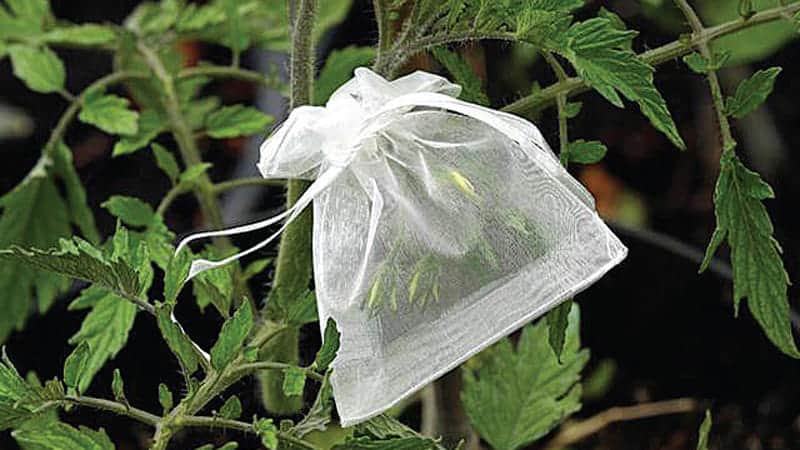Random pollination is the pollination between 2 or more different varieties of peppers without purpose. This will result in peppers that have no pure flavor and are adulterated by other varieties.
So, if you’re trying to protect your pepper plants to get seeds for the next crop, the problem of random pollination is very serious.
How to keep peppers from cross-pollination? To answer this question, we will learn and analyze the causes and ways to overcome random pollination in chili plants.
What Causes Cross-Pollination Of Pepper Plants?
Random pollination is a completely normal phenomenon in nature and cultivation. Pollination helps pepper plants and other plants to flower and bear fruit naturally.
There are many causes of cross-pollination in peppers including:
Insects:
- Insects: Insects are the most common cause of random pollination in pepper plants. When insects take nectar and fly from one tree to another, the pollen is carried everywhere and leads to natural cross-pollination. The greater the number of insects in your garden, the greater the chance of pollen being mixed.
- Wind and weather effects: Factors such as wind and rain also cause cross-pollination to take place more often. Strong winds and rain will carry pollen across the garden and facilitate random pollination among pepper cultivars.
- Animals and people: In the process of caring for pepper plants, pollen can also cling to clothes, hair, or hands. This makes it possible for it to stick to animals or accidentally touch the flowers of other plants.
How to keep peppers from cross-pollination?
It can be very difficult to prevent complete cross-pollination, but there are some simple ways you can prevent it. Especially, when you know the cause of cross-pollination, apply some simple methods below.

1. Keep Cross-Pollination By Distance
As you know, cross-pollination can occur between 2 or more different varieties of pepper plants. So one of the simplest methods is that you should plant them far apart to limit this.
You can group pepper plants of the same type and place them 5 to 10 feet away from other peppers. However, this distance is as far as possible because it will limit insects and wind easily carrying pollen everywhere in your garden.
2. Keep Cross-Pollination With Plastic Bags
Another simple method that many gardeners frequently use if you don’t have a large space in the garden is to use a plastic bag to wrap the capsicum flowers as they begin to grow.
However, you must use paper bags, mesh bags, and cloth bags with air holes to ensure that the flowers of the chili plant can still grow normally.
This method is simple but can be time-consuming and expensive. If you’re just growing a few different chili plants, this method can work.
During this process, you need to monitor and check continuously to avoid wrapping the bag and causing the flowers of the chili plant to be damaged or not develop normally. Don’t forget to learn more about stimulating pepper plants for maximum yield here.
You should only remove the bag when the fruit has started to set and develop otherwise cross-pollination can still occur.
3. Keep Cross-Pollination By The Barrier
In case you don’t want to waste your planting space having to plant different varieties of chili peppers apart, you can alternate plants or vegetables as a natural barrier.
You should plant tall plants or vegetables that can be used as trellises to prevent pollen from being carried around by the wind. Because the thick foliage can also help prevent insects from coming to collect honey and fly to other places.
However, you should not plant too thick or completely cover the pepper plants because they still need light, wind, and rain to grow normally. Trussing should be carefully calculated when the pepper plants have started to flower and pollinate.
4. Keep Cross-Pollination With Tents
If you want to eliminate cross-pollination between different peppers, you should opt for complete isolation. This means that you need to isolate the peppers in well-ventilated tents.
This is similar to chili peppers grown in a greenhouse to give a pure flavor and not be adulterated by any other varieties. You can use mesh or plastic film to form the tent and prevent cross-pollination.
During this process, you also need to check regularly to make sure the pepper plants can grow and pollination is happening normally. Avoid the use of mesh or too thick plastic film that restricts light and water, making chili plants unable to grow normally.
Conclusion
Cross-pollination is a common phenomenon in nature due to many reasons such as insects, rain, wind, or people accidentally carrying pollen everywhere.
Preventing cross-pollination isn’t too difficult either, so just make sure you keep a safe distance between the different varieties of peppers between 5 and 10 feet, using mesh bags to wrap the flowers while they’re blooming and grow intercropping or isolation.
If you want to learn more about how to grow and care for different types of peppers, don’t forget to learn more in the peppers articles here.